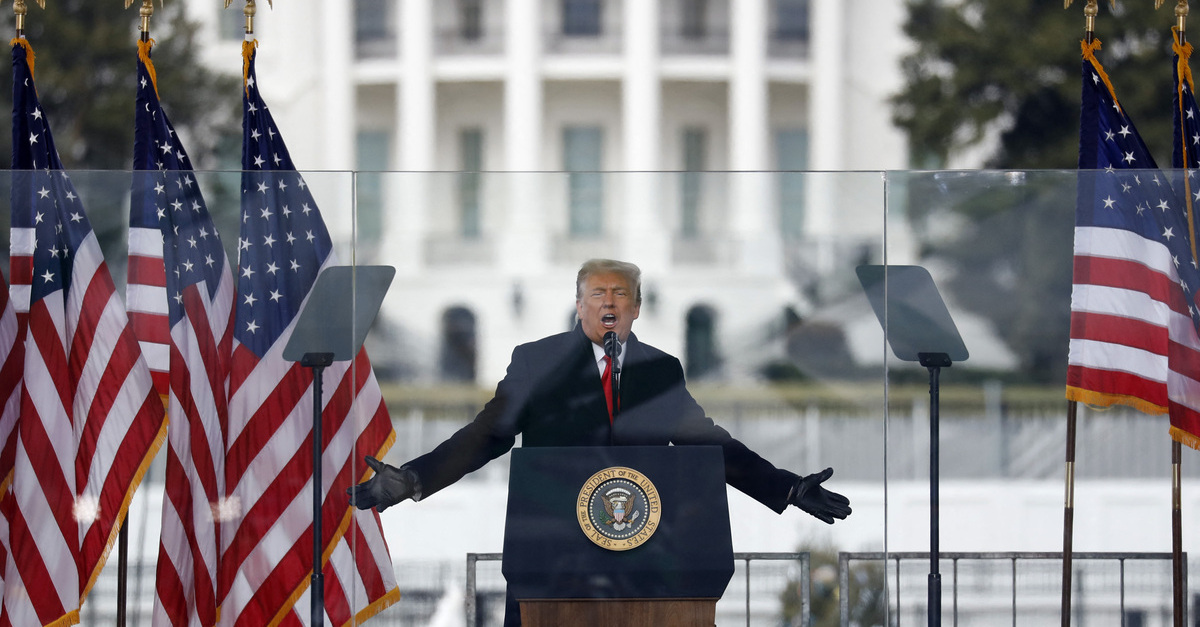
U.S. President Donald Trump speaks to his supporters at Save America Rally on the Ellipse near the White House in Washington on January 6, 2021 Photo by Yuri Gripas/Abaca/Sipa USA (Sipa via AP Images).
Donald Trump urged a federal court to toss out a series of lawsuits filed against him by members of Congress for allegedly inciting the Jan. 6 attack on the Capitol, arguing that holding him liable for the riot would unconstitutionally violate his First Amendment rights. To articulate this point, Trump’s attorneys compared his speech at the Ellipse to a rapper known for “aggressive, provocative lyrics.”
This consolidated series of lawsuits stems from a complaint made by Rep. Bennie Thompson, D-Miss., the former chairman of the now-defunct House Select Committee to Investigate the Jan. 6 Attack on the U.S. Capitol, as well as lead plaintiff Rep. Barbara Lee, D-Calif., and others like Reps. Eric Swalwell, D-Calif. and police officers including Conrad Smith, Bobby Tabron, Briana Kirkland and others.
The parties collectively contend that Trump, acting in his personal capacity, violated the Ku Klux Klan Act of 1871, a law barring mob violence directed at federal officials, and they have made allegations of physical and emotional injury because of his conduct leading up to and on Jan. 6, 2021.
In a 35-page motion filed Friday in the federal district court in Washington, D.C., Trump asked the court to reverse a previous ruling which held that the plaintiffs in the case had plausibly alleged that Trump’s Jan. 6, 2021, speech had “incited the crowd to violence.”
The filing posits a hypothetical rapper who is “ranked as one of the most controversial lyricists of all time” and is “particularly popular among angsty teenagers.” It specifically refers to Chief Justice John Roberts reciting rapper Eminem’s lyrics about drowning his wife in the song “97 Bonnie and Clyde” during oral arguments in an unrelated case in 2014.
“Many of his lyrics describe explicit violent acts, including gun violence, rape, and a description of the rapper drowning his wife,” the filing states. “While at times, the rapper’s lyrics suggest that his work is not intended to encourage or endorse actual violence, other lyrics suggest the contrary. There is extensive news coverage of the impact that the rapper’s music has on young people, commenting on how it incites them to act emotionally and sometimes violently. The rapper publicly acknowledges that he is aware that his music is causing some of his fans to commit violence.”
The hypothetical goes on to describe the rapper taking the stage at an “enormous concert venue” where he “stokes his audience’s passions” and yells for them to “Fight the Establishment” and “Fight like hell,” the latter of which Trump actually said during his Jan. 6 speech.
“Inspired by the rapper’s fiery rhetoric, several of his fans decide to mirror his expressed disdain for authority by storming the nearest establishments, stealing food from the venue’s concession stands, violently attacking the vendors, and beating down security guards to access the backstage areas of the venue,” the motion stated.
Trump argues that while the rapper’s speech would historically “fall squarely within the protections of the First Amendment,” the court’s previous order could hold him liable by finding that his speech contained “an implicit call for imminent violence or lawlessness.” Such an outcome is “constitutionally impermissible” and would “open floodgates to incitement liability for future speakers of all types (not just politicians and presidents),” according to Trump.
Trump has already appealed the trial court’s previous ruling on grounds that he was entitled to official-act immunity a president. Should the court rule against Trump on First Amendment grounds, he asked the court to certify the issue for appeal so that the appellate court can consider both arguments in tandem.



